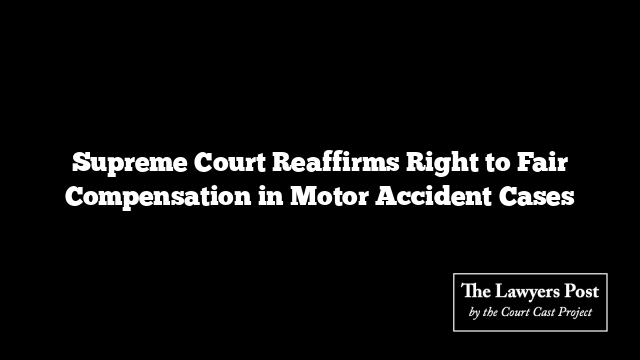In a pivotal ruling, the Supreme Court has reinforced that the compensation awarded in motor accident cases should not be limited to the claimant’s rough calculations. The Court emphasized that both the Motor Accident Claims Tribunal and the High Court are mandated to assess and award a “just and reasonable” compensation amount, irrespective of what the claimant initially sought.
In a recent decision, the Court referred to a previous case, stating, “It is a settled principle of law that the amount of compensation claimed does not restrict the Tribunal or the High Court from awarding more, as long as it is deemed fair.” The ruling serves as a reminder that the Court has a fundamental duty to ensure that compensation reflects the true extent of loss, rather than being confined to arbitrary figures provided by claimants.
The case involved a 32-year-old appellant who suffered severe neurological injuries resulting in a 100% functional disability following a motor vehicle accident. Initially, the High Court awarded him ₹30,99,873, based on outdated income calculations. However, the Supreme Court found that the assessment was flawed, as it was based on income tax returns from two years prior to the accident rather than the year immediately preceding it. The Court subsequently increased the total compensation to ₹52,31,000, acknowledging the progressive nature of the appellant’s income and the impact of the injuries on his future prospects.
In the context of the case, the Court assessed various components of the compensation package, including future income loss, medical expenses, and the mental anguish experienced by the appellant. It noted that the appellant’s past income was not accurately represented in previous assessments and established a new annual income figure of ₹2,00,000, reflecting his position as a Branch Manager prior to the accident.
The ruling also included additional compensation for future medical needs and loss of marriage prospects, highlighting the need for a comprehensive evaluation of all factors impacting the claimant’s life post-accident. The Court’s decision underscores its commitment to ensuring that victims of motor accidents receive adequate financial support to cover their ongoing needs and challenges.
This landmark judgment sets a crucial precedent for future motor accident claims, asserting that courts must not only take the claimant’s figures into account but must also diligently pursue a fair and equitable assessment of damages.





